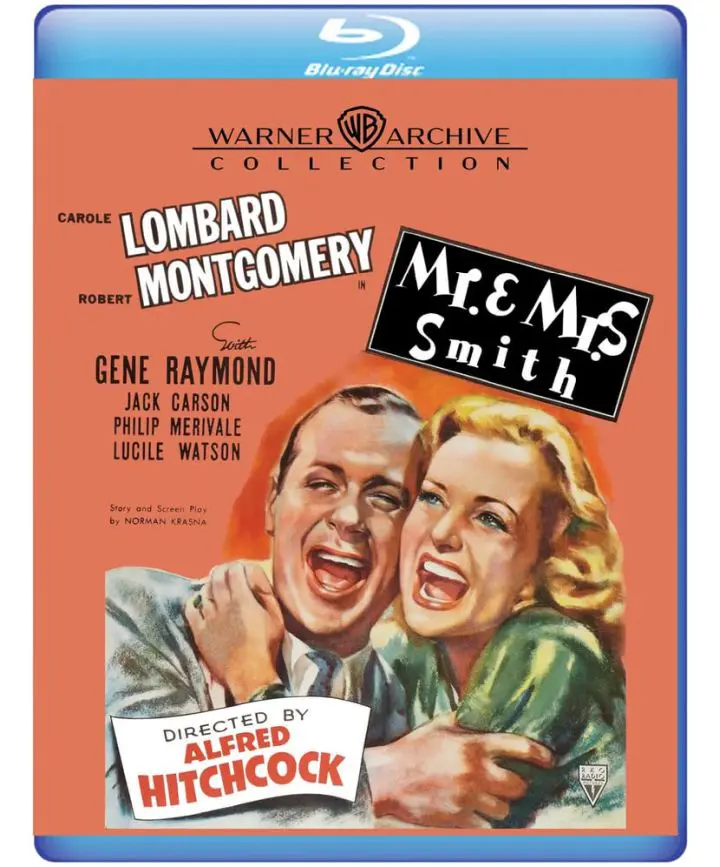
There’s an underrated aspect of Hitchcock’s films, and that is their comedy. The comedy tends to be ironic, and based on character, but it’s always there. And several of his early films, in the silent era and the early sound, tend toward the softly comic. Even his dramas were not sturm und drang melodramas. But Mr. and Mrs. Smith (1941), was his first Hollywood film that was strictly a comedic film. One of only three (including The Trouble With Harry and Family Plot) in his post-British career. And those two movies had the decency to have dead bodies in them.
Buy Mr. and Mrs. Smith Blu-rayThe plot of Mr. and Mrs. Smith is twisty enough to be worthy of Hitchcock’s attention. A married couple with a stormy relationship each finds out, independently, that because of a legal quirk, they’re not really married. Mrs. Ann Smith (Carole Lombard) waits for her husband to romantically propose to her. Mr. David Smith (Robert Montgomery) … doesn’t. And so, the two go to war.
Kind of. It’s a great set-up for a fun satirical comedy, something like a more worldly and world-weary version of Murnau’s Sunrise. But the screenplay isn’t terribly interesting. It sets the two against each other right from the start but doesn’t have them oppose each other in any particularly interesting ways. He doesn’t get a girl; she gets a guy pretty quickly.
It’s his business partner, and so David blusters against him… but the movie plays itself out as a standard comedy. The performances are fine, but there are no standout sequences that Hitchcock is known for. The best part is early in the movie, where Mr. Smith knows they aren’t married. So does Mrs. Smith, but he doesn’t know that. She waits for a proposal that doesn’t come. It creates some interesting tension.
After that, it’s just shenanigans. Some of them are amusing, some aren’t. It’s a well-performed and well-filmed story, with not much to stand out. Robert Montgomery is a little smarmy as Dave. He’s a smarmy character, but there’s not enough charm to make him win you over. Carole Lombard is filled with fun, feisty energy as Ann. This was, incidentally, the last film of hers released before her death, though not the last film shot.
What I, a major Hitchcock fan, found most disappointing was that I was never invested in any of the characters. Hitchcock is known as the master of suspense, but I rather think of him as the master of sympathy. His major talent is, with very little scenework, creating complete sympathy in his audience for characters that minutes earlier they might have despised. The most famous example of this is in Psycho. Minutes after watching one of the most famous murders in movie history, the audience watches Norman Bates clean up the crime scene, and try to dispose of the body.
He does that with the woman’s own car. He pushes it out to the swamp, and it starts to sink… then stops. And the immediate reaction is, “Oh God, he might get caught!” The sympathy is entirely with Norman in that moment. And Hitchcock plays that chord repeatedly throughout his cinematic career. But here, it never quite lands. Mr. and Mrs. Smith might be estranged from each other 10 minutes into the movie, but they were estranged from me the entire film. I never cared what happened to them.
This doesn’t make it a bad film. There are funny sequences, and it’s competently made. But it doesn’t have the particular Hitchcock magic that elevates several of his films. Hitchcock’s movies tend to have bite. Mr. and Mrs. Smith feels a little gummy.
Mr. and Mrs. Smith has been released on Blu-ray by Warner Archive Collection. Extras include a featurette, “Mr. Hitchcock meets the Smiths” (16 min), two radio adaptations of the film: a Lux Radio Theater broadcast with Bob Hope and Carole Lombard (60 min), and a Screen Guild Players Broadcast with Errol Flynn and Lana Turner. The rest of the extras have nothing to do with the film. They’re typical “Warner Night at the Movies” style extras: a pair of cartoons: “Holiday Highlights” (7 min) and “Stage Fright” (7 min); and a short called “Cinderella’s Feller” (20 min).